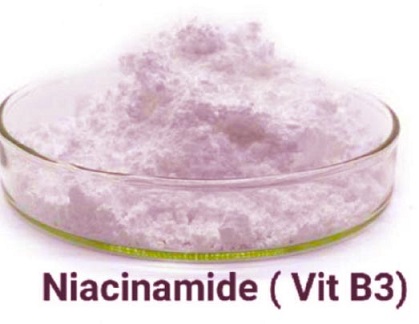Nikhil Prasad Fact checked by:Thailand Medical News Team Aug 06, 2024 8 months, 2 weeks, 6 days, 12 hours, 33 minutes ago
Health News: Researchers from Sharon Personal Care Ltd. have uncovered groundbreaking insights into niacinamide, a common skincare ingredient, revealing its powerful antimicrobial properties. This
Health News report explores these findings, providing a glimpse into niacinamide's potential to revolutionize skincare and personal care products by keeping harmful microbes at bay.
 Antimicrobial properties of Niacinamide discovered
What is Niacinamide?
Antimicrobial properties of Niacinamide discovered
What is Niacinamide?
Niacinamide, also known as vitamin B3, is a versatile compound celebrated for its numerous skin benefits. It is derived from niacin and is found in many foods, including fish, poultry, meat, milk, and green vegetables. Besides being an essential nutrient, niacinamide is a key player in producing nicotinamide adenine dinucleotide (NAD+), a molecule crucial for energy production and DNA repair.
The Study's Objective
The study aimed to delve deeper into niacinamide's antimicrobial effects, particularly how it interacts with and inhibits the growth of various microorganisms commonly found in cosmetic products. Previous research had hinted at its ability to boost the immune response and produce antimicrobial peptides, but this study sought to understand niacinamide's direct impact on microbes.
Methodology
Researchers conducted a series of experiments to evaluate niacinamide's antimicrobial efficacy. They used a range of microorganisms, including E. coli, Staphylococcus aureus, Pseudomonas aeruginosa, Candida albicans, and Aspergillus brasiliensis, testing them under various concentrations of niacinamide.
Key Findings
Antimicrobial Activity
The study found that niacinamide significantly inhibits microbial growth, but only at high concentrations (1.5-4%). Among the tested microorganisms, P. aeruginosa, known for its resilience, was the most sensitive to niacinamide, while A. brasiliensis exhibited the highest resistance.
Morphological Changes
Using advanced microscopy techniques, researchers observed that niacinamide causes noticeable changes in microbial cell structures. In Candida albicans, niacinamide led to thickening of the cell wall and membrane alterations. For bacteria like E. coli and P. aeruginosa, niacinamide treatment resulted in elongated cell shapes, indicating a disruption in their normal cell division process.
DNA Interaction
One of the most intriguing findings was niacinamide's direct interaction with microbial DNA. The study revealed that niacinamide can bind to DNA, causing structural changes that hinder successful DNA replication. This interaction likely contributes to its antimicrobial effects, as it disrupts the microbes' ability to multiply and thrive.
Implications for Skincare
These findings suggest that niacinamide could be a powerful ingredient in
skincare products, not just for its well-known benefits like improving skin elasticity and reducing inflammation, but also for its ability to protect against microbial contamination. This dual functionality makes niacinamide an attractive option for formulators looking to create effective and safe skincare solutions.
Future Directions
The study opens the door for further research into niacinamide's antimicrobial mechanisms and potential applications. By understanding how niacinamide disrupts microbial processes, scientists can develop new formulations that maximize its benefits while ensuring the safety and efficacy of personal care products.
Conclusion
The discovery of niacinamide's antimicrobial properties adds a new dimension to its role in skincare. Its ability to inhibit harmful microbes, alongside its established skin benefits, positions niacinamide as a multifunctional powerhouse in the cosmetic industry. This study highlights the need for ongoing research to fully harness its potential.
The study findings were published in the peer-reviewed journal: Microorganisms.
https://www.mdpi.com/2076-2607/12/8/1581
For the latest
Health News, keep on logging to Thailand Medical News.
Read Also:
https://www.thailandmedical.news/news/lactoferrin-a-new-player-in-the-world-of-aesthetics-and-skincare
https://www.thailandmedical.news/news/rhodamine-19-alkyl-esters-mitochondria-targeted-antioxidants-that-fight-against-bacterial-infections
